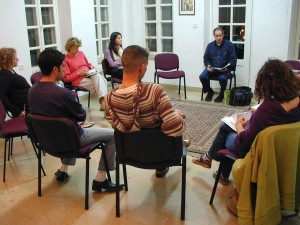Last Meeting of the Distance-Learning Community Dialogue Course
The 14-weeks long Distance-Learning Community Dialogue Course concluded today. The course consisted of five distance-learning units and five face-to-face meetings. The twenty participants requested an on-going peer group that will accompany their community dialogue initiatives. We hope that the Gishurim program that sponsored the course will be able to provide this service. The course facilitators, Dr. Orna shemer and Dr. Hagai Agmon-Snir, will probably facilitate these peer meetings.
In their feedback, the participants stated that the course has significantly leveraged their ability to plan and initiate responses to community conflicts and opportunities. During the course they presented and discussed the various initiatives they were developing in their community dialogue and mediation centers. This was the first ever community dialogue course of the Gishurim project and we hope it will be repeated in the future.




